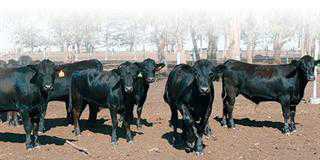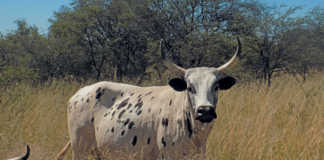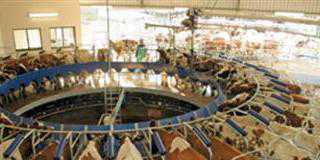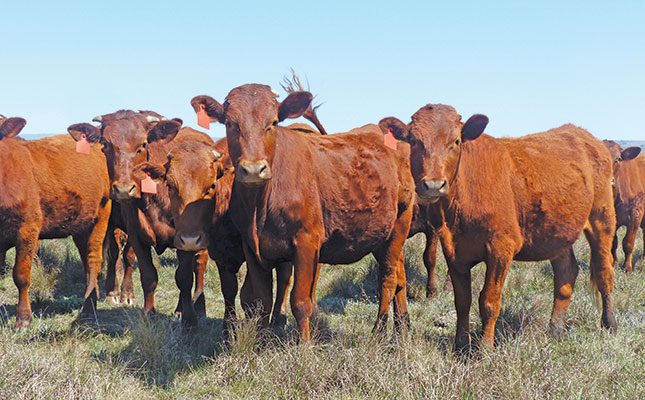
Photo: Mike Burgess
“I go full force for Bonsmara. When you farm cattle, it’s good to focus [on a specific breed].” So says Mthobeli Dintsi of his approach to beef production on his 646ha farm, Flatfield, near Cathcart in the Eastern Cape, which is home to about 100 Bonsmara-type breeding females.
Dintsi also has a state land reform farm near Indwe, where he runs about 100 crossbred cows put to Bonsmara bulls.
His focus now is to build a herd of top commercial Bonsmaras on Flatfield and then expand his beef operation on more land in the Cathcart district.
From communal to commercial
Dintsi’s interest in livestock farming began in the former Transkei region of Lady Frere where he was born and raised. From a young age, he was required to herd the family’s cattle in the vast communal grazing areas, a job that held considerable responsibility, as his father, Nimrod, was a migrant worker in the Western Cape.
Dintsi recalls that back then, “there was no focus on a specific breed; we just bought cattle, and that’s where it all started”.
In the early 1980s, Dintsi became a migrant worker himself, first on the copper mines near Prieska in the Northern Cape, and thereafter in the gold mines near Klerksdorp in today’s North West.
After several years in the mining industry, Dintsi returned to the Eastern Cape and enrolled for a course as a motor mechanic at a technical college in Ezibeleni near Queenstown in the late 1980s.
In the early 1990s he became a student at the Eastern Cape Technikon in Butterworth, and obtained a National Accredited Technical Education Diploma.
This enabled him to land a job at the Eastern Cape Department of Education, where he was involved in helping to plan new schools and improve infrastructure. He excelled in this post and in 2002 was promoted to the National Department of Education in Pretoria under the same portfolio.
During all this time, Dintsi continued to run livestock in the former Transkei. Then, in 2009, he and his family were awarded a 575ha land reform farm, ‘Uitkyk’, near Indwe via government’s Land Redistribution for Agricultural Development programme. He lost no time in relocating his livestock to this property, delighted to put the difficulties of communal farming behind him.
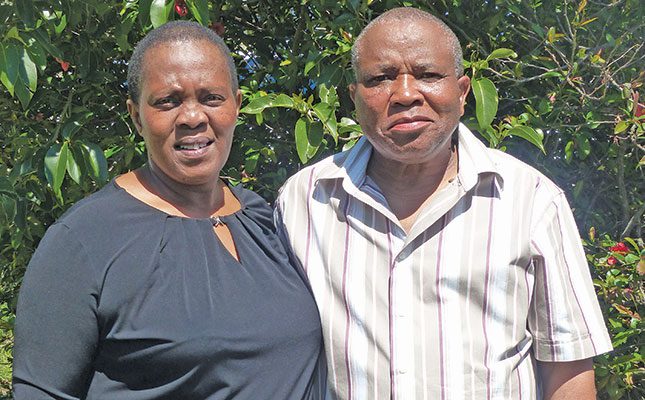
Still working in Pretoria, Dintsi farmed on Uitkyk by ‘remote control’ for several years before finally retiring in 2016. The time had come for him to engage himself fully in his passion for beef production!
He purchased the mixed-veld farm Flatfield, an event that doubled as a lifelong goal to live on and manage his own commercial livestock farm.
Quality Bonsmara female animals
Dintsi’s experiments with the Bonsmara breed began in 2012 when he put Bonsmara bulls to his crossbred cattle on Uitkyk.
This meant that by the time he needed to stock Flatfield, he had a number of quality Bonsmara-type females. Nevertheless, he admits to having experimented with South Devons and Fenfield Reds (the latter a locally developed ‘breed’ from the Eastern Cape) during the first couple of years on Flatfield.
Although happy with his cattle’s performance, he became convinced by the economic value of the Bonsmara.
“The Bonsmara grows well and females have no problem with calving,” he says. “I also see the positive results that other farmers achieve with the breed.”
One such farmer is his neighbour, John Fletcher, a commercial Bonsmara breeder from whom he has bought heifers.
Although Dintsi was compelled to sell some of his own Bonsmara-type heifers in order to purchase Fletcher’s animals, he usually integrates most of his heifers into his breeding herd, as cows are culled after eight to 10 years of production.
When his heifers are two years old, he puts them to bulls sourced from commercial and stud breeders across the Eastern Cape. The mating season runs from October to December.
His herd on Flatfield achieved an impressive 80% calving rate in the past breeding season, while calves are weaned and marketed between seven and eight months, at which stage they average between 200kg and 210kg.
Grazing, feed supplements and state assistance
Flatfield’s water resources include boreholes, dams and a non-perennial river, allowing the entire property to be grazed by the cattle as well as a flock of about 200 Dohne Merino ewes.
Flatfield has about 25ha of arable land of which a portion is put under dryland maize each year. Due to waterlogged lands and destruction by bushpigs, Dintsi had a modest harvest of 12t of maize from 7ha in 2022.
He uses the grain as an ingredient in a protein lick for winter and a phosphate lick for summer, both of which he mixes on-farm. Maize residue offers an extra source of feed for the cattle in late winter and autumn, while 1ha of dryland lucerne is ring-fenced for the sheep.
The Eastern Cape Department of Agriculture and Agrarian Reform provides Dintsi with mechanisation services for his cropping initiatives on the understanding that he supplies the inputs.
The state veterinary services contribute to his annual standard inoculation programme, and he controls internal and external parasites himself, injecting the cattle every three to four months.
Although Dintsi does not expect any support from the state, he is grateful when it is offered.
“I don’t always have money to do things here, but I also don’t want to depend on government. I just carry on doing what I must do, and if I receive help [from the state], I appreciate it,” he says. Besides the significant state support, Dintsi adds that commercial farmers in the Cathcart region have been kind and welcoming.
“It’s wonderful here,” he says. “The farmers are so helpful. I have very good neighbours.”
Phone Mthobeli Dintsi on 083 630 7114, or email him at [email protected].








